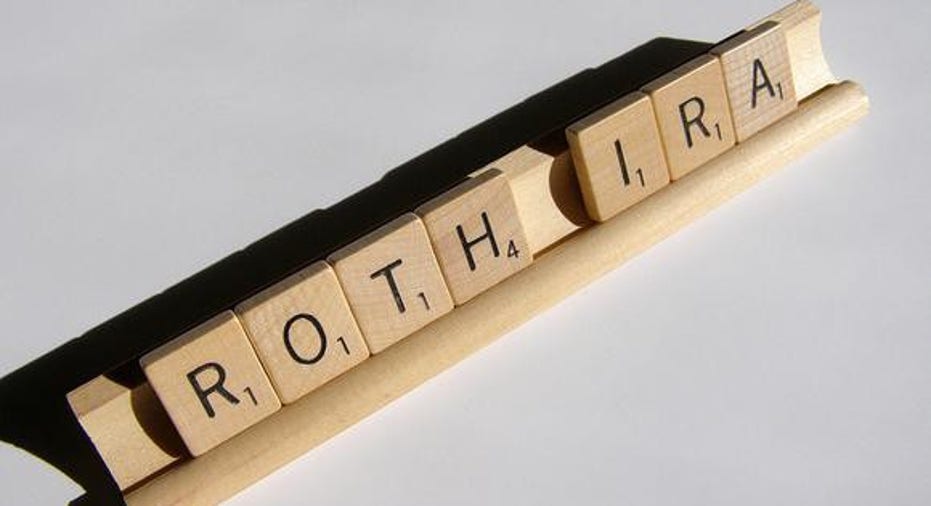Should You Convert Your IRA?

Image source: Stockmonkeys.com via Flickr.
Anyone who has a traditional retirement account like an IRA or 401(k) needs to consider whether they should convert their account to a Roth IRA. The biggest benefit of a Roth IRA is the fact that distributions from the retirement account are tax-free. That stands in stark contrast to the comparable treatment of traditional IRAs and their typical requirement to include all withdrawals in your taxable income in the year in which you receive them. By converting your IRA to a Roth, you can reap all those future benefits, but they come with an upfront cost. Below, we'll run through some of the issues you should consider in deciding whether to do a Roth conversion.
Issue No. 1: What's your current tax bracket?
The cost of converting your IRA to a Roth is that you'll have to include the amount converted as taxable income in the current tax year. That will add to your tax bill immediately, with the trade-off coming many years into the future when you start taking withdrawals from your Roth IRA.
Therefore, one key issue is whether you're in a low or high tax bracket right now. If you're paying low tax rates currently, then converting your IRA to a Roth makes more sense, because the upfront tax cost of the conversion will be relatively low. The Roth conversion looks even more attractive if you'll be in a higher tax bracket in retirement, because by converting, you'll effectively shift taxable income forward into a lower-rate period.
On the other hand, if you're in a high tax bracket right now, adding to your tax burden by doing a Roth conversion is less attractive. That's especially so if you expect to be in a lower tax bracket after you retire, because you always have the option of keeping your retirement money in the traditional IRA and paying tax on the distributions when you take them.
Issue No. 2: How will converting affect your eligibility for other tax benefits, both now and in the future?
Converting your IRA to a Roth has two impacts: it increases your taxable income in the year of conversion, and it potentially decreases it down the road after you retire. Those shifts can affect your eligibility for other tax breaks, and so it makes sense to coordinate your tax planning.
For example, certain tax credits are available only to those with incomes below certain limits. If the conversion pushes you above those limits, then it will cost you a potential credit, adding to the total tax cost of the move. At the same time, though, Roth IRA distributions will be tax-free in retirement, and that can increase your eligibility for other tax breaks down the road that can offset any added tax liability currently. How that trade-off ends up balancing out depends on your individual situation, but it's important not just to consider the current impact but also to estimate future effects as well.
Issue No. 3: Will you need the money? If not, a Roth IRA gives you more flexibility.
Traditional IRAs force you to start taking required minimum distributions once you reach age 70 1/2. The net impact of the minimum distribution requirements is to encourage you to exhaust your retirement savings during your lifetime. Any remaining funds will go to their heirs you select in the beneficiary designation for the IRA.
Roth IRAs also have you name a beneficiary, but there aren't any required minimum distributions requirements. As a result, if you and your heirs plan things correctly, you can get tax-free treatment for a large portion of your retirement assets not only throughout your lifetime but also during much of your heirs' lives as well. That's an opportunity that is worth a closer look.
Issue No. 4: Having doubts? Feel free to convert -- because you can change your mind.
Roth conversions are one of the few things where you get a chance at an automatic do-over. You can effectively undo converting your IRA to a Roth as long as you do so before the filing deadline for the year in which you make the conversion.
That gives you a chance to see how things work out. If the value of your investments goes down, then you can undo the conversion with the intent of redoing it subsequently. That way, you'll only get taxed on the lower value of the account. By contrast, if your portfolio skyrockets, then you'll want to leave the conversion alone because you'll have locked in a low taxable value.
For many, converting an IRA to a Roth is their only chance to take advantage of this valuable tax provision for retirement saving. If these factors weigh in favor of a conversion, it makes sense to contact your financial institution to find out what's necessary to convert your IRA.
The article Should You Convert Your IRA? originally appeared on Fool.com.
Try any of our Foolish newsletter services free for 30 days. We Fools may not all hold the same opinions, but we all believe that considering a diverse range of insights makes us better investors. The Motley Fool has a disclosure policy.
Copyright 1995 - 2016 The Motley Fool, LLC. All rights reserved. The Motley Fool has a disclosure policy.



















